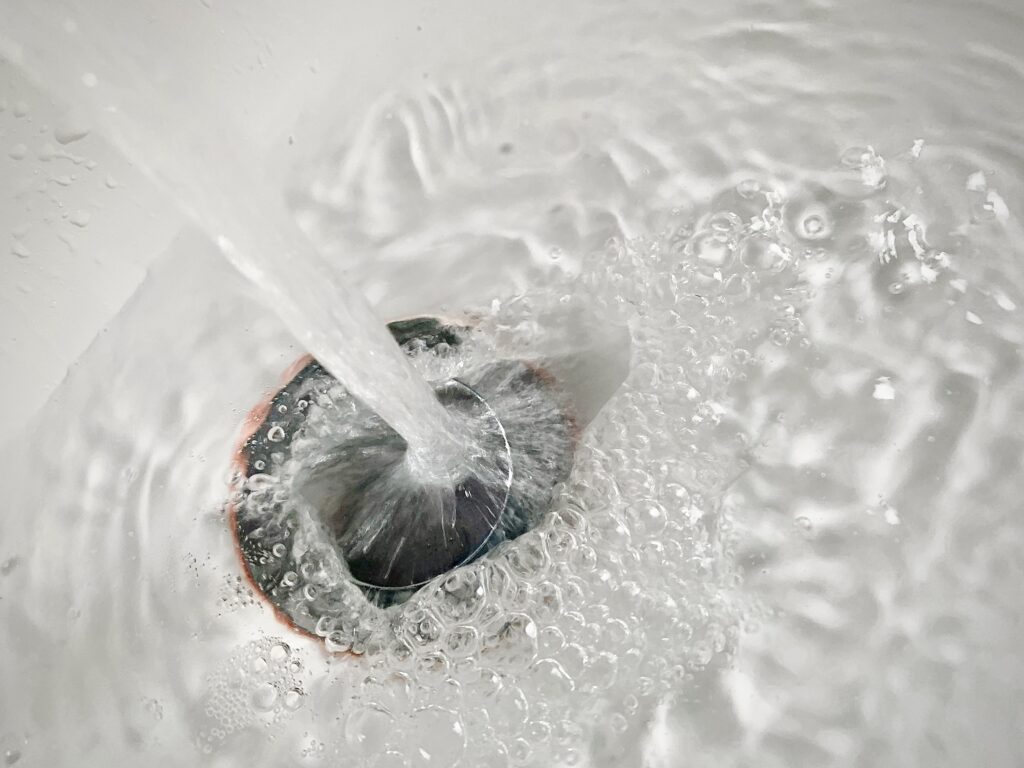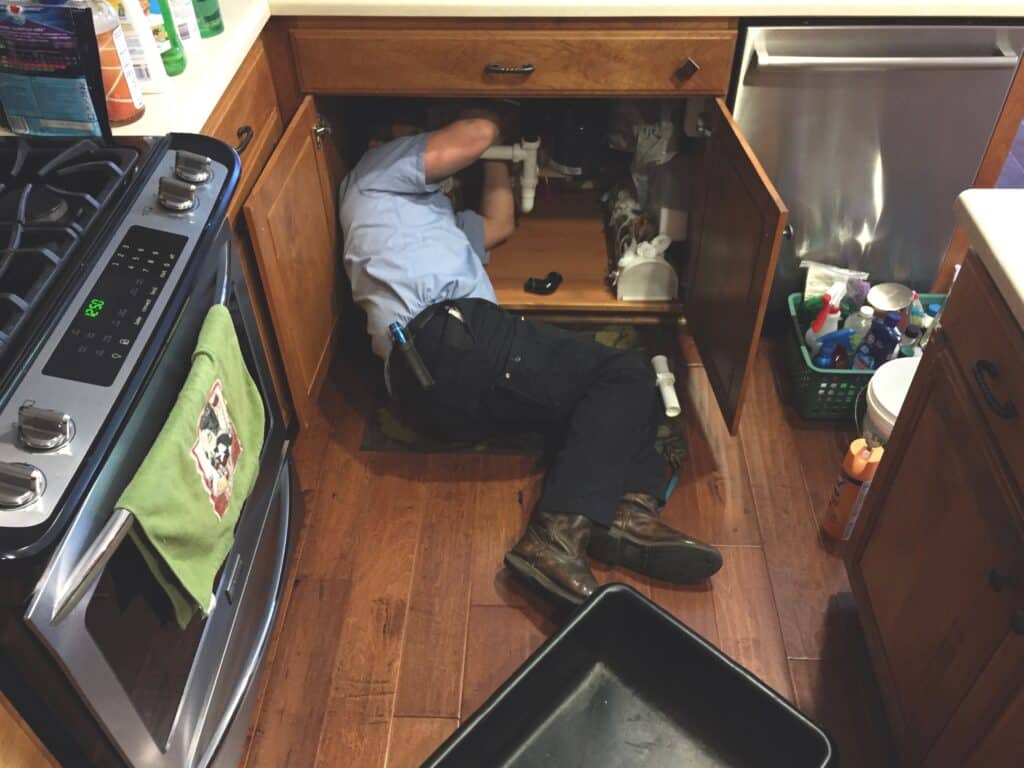There’s nothing quite as unsettling as entering your home and being greeted by an offensive and nauseating sewer smell. The terrible odor can quickly turn your haven into a discomfort zone. If you’re grappling with the unpleasant issue of a sewer smell in your house, you’re not alone. In this comprehensive guide, we’ll explore the potential reasons behind this intrusive odor and provide you with a range of effective solutions to help you reclaim the fresh and inviting atmosphere of your living space. Let’s embark on the journey of combating the dreaded “sewer smell in house.”
Causes of Sewer Odor in Your House

When you detect a sewer smell in your house, it’s important to understand where it’s coming from. Below are some possible sources of the unpleasant odor:
Dry P-Traps:
P-traps are U-shaped pipes located beneath sinks, showers, and toilets. Their function is to hold water to prevent sewer gases from entering your home. However, if these fixtures remain unused for an extended period of time, the water in the P-traps can evaporate, which allows the unpleasant odors to seep into your living space.
To address this issue, you can run water in infrequently used sinks, showers, and toilets to ensure that the P-traps are filled with water. Adding a few drops of essential oils like peppermint or lemon can also help to mask the odor.
Blocked Vents:
Your plumbing system is equipped with vent pipes that facilitate the release of sewer gases outside. When these vents become clogged with debris, animal nests, or ice accumulation in colder climates, the gases may flow back into your home.
To prevent vent blockages, it’s important to regularly clean out your gutters and remove any debris that may have accumulated on your roof. Also, consider installing a mesh screen over the vent pipe opening to prevent animals from nesting there.
Faulty Seals:
If seals around toilets, drains, or pipes are damaged or improperly installed, they can become pathways for sewer gases to seep into your home. This can lead to a pervasive odor that may be difficult to eliminate.
To address this issue, you may need to hire a professional plumber to inspect and repair any damaged seals. In the meantime, try masking the odor with essential oils or opening windows to improve ventilation.
Sewer Line Complications:
A cracked or damaged sewer line can release foul odors into your house. This is a more serious issue that typically requires professional intervention.
To address this problem, you may need to hire a professional plumber to inspect your sewer line and identify any damage. Depending on the extent of the damage, the plumber may recommend repair or replacement of the sewer line.
Clogged Drains:
The accumulation of hair, organic matter, grease, and other debris can lead to unpleasant smells emanating from sinks and showers. Regular cleaning and maintenance of your drains can help prevent this issue.
To address clogged drains, you can use a plunger or a drain snake to remove any blockages. You can also use a mixture of baking soda and vinegar to clean out your drains and eliminate any odors.
Tips To Eliminate Sewer Smell in House

Having to deal with a sewer smell in your house can be quite unpleasant, but there are practical steps you can take to eliminate the odor and restore a pleasant ambiance to your home. Here are some tips to help you get started:
Keep Water Flowing:
One way to prevent water in P-traps from evaporating is to make sure you regularly run water in sinks, showers, and floor drains that are not frequently used. By doing this, you can ensure that the barrier against sewer gases remains intact and thus prevent foul odors from permeating your living space.
Vent Inspection and Clearance:
If you suspect your vents are blocked, inspecting your roof for debris or obstructions thoroughly is a good idea. Clearing these vents can help reinstate proper airflow, preventing gases from entering your home and causing unpleasant smells.
Seal Check and Replacement:
Another thing you can do is to examine the seals around toilets, drains, and pipe connections. Over time, these seals can become damaged or worn, which can lead to the escape of sewer gases. By taking the time to promptly check and replace any damaged or worn seals, you can prevent this from happening and thus minimize any unpleasant odors in your home.
Professional Expertise:
If you suspect that there are issues with your sewer line, it’s best to consult a professional plumber. They can perform camera inspections to identify and address any complications within your sewer system, which can help you eliminate any sewer smells and keep your home smelling fresh and clean.
Regular Drain Maintenance:
One way to prevent clogs and eliminate potential odor sources is to routinely clean out your drains. You can do this by using a mixture of baking soda and vinegar followed by hot water. This can effectively keep your drains clear and minimize any unpleasant smells in your home.
Odor Traps:
Another option you can consider is installing odor traps. These are specialized devices designed to capture and neutralize sewer odors before they can make their way into your living space. By installing odor traps, you can help ensure your home smells fresh and clean.
Consult the Experts:
If you’re unable to locate the source of the sewer smell or if the issue persists, don’t hesitate to seek help from a professional plumber. Their experience and knowledge can effectively resolve complex plumbing problems and help you keep your home smelling pleasant and odor-free.
Ways to Prevent a Sewer Smell in House

A sewer smell can be a major source of discomfort, and while addressing the current issue is essential, taking preventive measures can save you from future olfactory disturbances. Here are some additional ways to keep your house smelling fresh:
Routine Maintenance:
Make it a practice to schedule regular plumbing maintenance. This can help detect and rectify issues early and provide preventative measures to keep your pipes and sewer lines clean and free from buildup.
Mindful Flushing:
Educate your household about responsible flushing habits. While it’s common knowledge that items like wipes, feminine hygiene products, and paper towels should not be flushed down the toilet, there are other things to keep in mind as well. For example, if you have an older home, consider upgrading to a low-flow toilet to reduce the amount of water used per flush. Additionally, using toilet bowl cleaners that contain bleach can help keep your pipes and sewer lines clean.
Responsible Grease Disposal:
Dispose of cooking grease and oils properly instead of pouring them down the drain. This simple step can go a long way in preventing sewer line buildup. Consider using a sealable container specifically designed for grease disposal, or simply let the grease cool and solidify before throwing it in the trash.
Landscaping Awareness:
When engaging in landscaping activities, avoid inadvertently damaging your sewer lines. Consider installing a root barrier to prevent tree roots from growing into your pipes, and avoid placing heavy objects or driving heavy machinery over your sewer lines.
Dealing with a persistent sewer smell in your house might feel like a daunting challenge, but armed with knowledge and proactive solutions, you can triumph over this issue and restore the comfort of your living space. By understanding potential sources, taking action, and using preventive measures, you’re not just eliminating an unwelcome odor but creating an environment that promotes well-being, relaxation, and peace of mind. If you need help removing a sewer smell from your house, contact Workhouse Plumbing. We can diagnose the cause, come up with solutions, and offer preventative advice.







